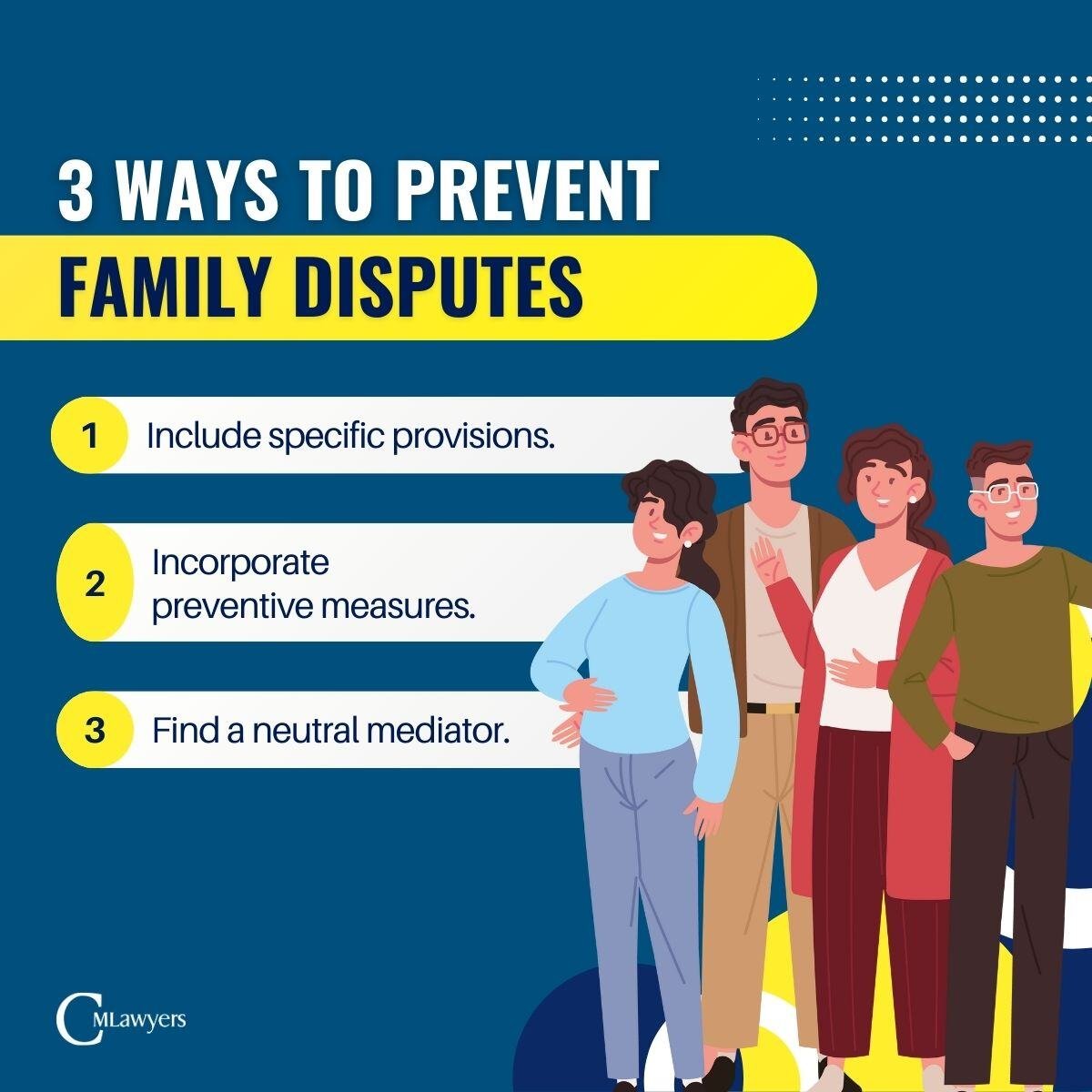What happens when you cut your children out of your will?
Lessons from Gene Hackman's Estate
Estate planning is a critical process for individuals seeking to ensure their wishes are respected and their assets distributed appropriately after their passing. The recent news of Gene Hackman reportedly excluding his children from his $80 million will has sparked discussions about the complexities and implications of estate planning decisions.
A well-structured estate plan can help prevent family disputes and costly legal battles, particularly when it comes to probate and contesting a will. Whether you want to safeguard your legacy or ensure your estate is distributed according to your wishes, working with an experienced probate lawyer is essential.
At CM Lawyers, we assist clients in navigating the legal intricacies of estate planning, probate, and will disputes. Our blog provides valuable insights into these issues, helping you understand your rights and options. If you're concerned about protecting your estate or need guidance on contesting a will, our team is here to help.
Gene Hackman’s Estate and Its Legal Complexities

Gene Hackman, the esteemed actor, and his wife, Betsy Arakawa, were found deceased in their Santa Fe, New Mexico home in February 2025. Arakawa, aged 65, reportedly succumbed to hantavirus pulmonary syndrome around February 11, while Hackman, aged 95 and suffering from advanced Alzheimer's disease, died approximately a week later from cardiovascular disease.
Hackman’s will, last updated in 2005, designated Arakawa as the sole beneficiary of his estimated $80 million estate, excluding his three children from a previous marriage: Christopher, Leslie, and Elizabeth. Arakawa's will included a provision that, in the event both she and Hackman died within 90 days of each other, their combined assets would be donated to charity.
Given that both passed away within this timeframe, the charitable donation clause could be enacted. However, legal experts suggest that Hackman’s children might still have a claim to the estate. Christopher Hackman has reportedly engaged an attorney, indicating a potential challenge to the will. The situation is further complicated by New Mexico’s community property laws, which could influence the distribution of the estate. The family has requested to seal investigative records related to the deaths to maintain privacy during this challenging time.
This case underscores the complexities that can arise in estate planning, especially when significant assets and blended families are involved.
Key Considerations in Estate Planning
Estate planning involves more than just drafting a will—it requires careful thought to prevent disputes, protect assets, and ensure your wishes are carried out. From clear communication to legal safeguards like trusts and tax strategies, taking the right steps can help secure your legacy and minimize the risk of legal challenges. Here are key considerations to keep in mind when planning your estate.

1. Communicate Intentions Clearly
Transparent communication is vital in estate planning, as misunderstandings or unspoken expectations can lead to disputes among beneficiaries. One of the most common reasons for contesting a will arises when heirs feel blindsided by its contents, particularly in cases of disinheritance or significant charitable donations.
To minimize conflicts and ensure a smoother probate process, individuals should:
- Discuss their estate plans with family members to clarify intentions and address concerns proactively.
- Document conversations or provide written explanations alongside the will to reduce misinterpretations.
- Seek guidance from a probate lawyer to structure their estate in a way that aligns with their wishes while reducing the likelihood of challenges.
Additionally, obtaining a grant of probate—the legal recognition of a will’s validity—can become complicated if disputes arise. Clear communication and proper legal planning help ensure that assets are distributed according to the deceased’s wishes while minimizing the risk of litigation.
2. Create a Legally Binding Will
A legally sound will is the cornerstone of effective estate planning, ensuring that assets are distributed according to the testator’s wishes. Without proper planning, disputes may arise, leading to delays in probate or even grounds for contesting a will. To avoid complications, individuals should:
- Clearly outline asset distribution, specifying both specific bequests and provisions for the residuary estate.
- Appoint a trusted executor capable of managing the estate impartially and efficiently through the probate process.
- Regularly update the will to reflect life changes such as marriage, divorce, or the birth of children, as outdated documents can lead to unintended consequences.
Failing to create or revise a will can result in intestacy laws determining asset distribution, which may not align with the individual’s wishes. Additionally, securing a grant of probate—the legal authority to administer the estate—can become more complex if a will is unclear or contested. Seeking advice from a probate lawyer can help ensure the document is legally sound, reducing the risk of disputes and streamlining the estate administration process.
3. Use Trusts for Enhanced Control
Trusts offer greater flexibility and protection compared to wills, especially when it comes to managing and distributing assets in complex family situations or for high-net-worth individuals. Unlike a will, which goes through probate and can be subject to challenges, trusts can provide a more seamless transfer of assets. Some types of trusts include:
- Discretionary Trusts: Allow trustees to distribute assets based on the beneficiaries' needs over time, offering flexibility and ensuring that wealth is allocated appropriately as circumstances evolve.
- Testamentary Trusts: Established through a will, these trusts provide long-term financial support, often used to manage assets for minors or dependents. They bypass the probate process, ensuring the transfer of wealth is efficient and in accordance with the deceased’s wishes.
- Special Needs Trusts: Designed to protect dependents with disabilities while preserving their eligibility for government benefits, these trusts help ensure the dependent's financial security without jeopardizing their support from public programs.
Trusts can help reduce the likelihood of contesting a will by specifying the conditions for inheritance, thus minimizing ambiguities that could lead to disputes. They also safeguard assets from mismanagement, creditors, or even divorce settlements. Moreover, unlike a will, trusts can avoid the lengthy probate process, and the grant of probate is not required, making the estate administration faster and more private. Working with a probate lawyer can ensure that the trust is set up correctly and aligns with the individual's estate planning goals.
4. Minimize Estate Taxes
For high-net-worth individuals (HNWI), minimizing estate taxes is a key concern to ensure that more of their wealth passes to intended beneficiaries. Failing to plan effectively could lead to excessive probate costs, delays, and potentially reduce the estate’s value. Strategies to minimize taxes include:
- Leveraging gift tax exemptions and generation-skipping transfer tax limits: These strategies allow individuals to reduce their taxable estate by gifting assets during their lifetime, thus lowering the overall estate tax liability upon their passing.
- Establishing charitable trusts or donations: Charitable contributions can help offset tax liabilities while also supporting philanthropic goals. By setting up charitable remainder trusts or other charitable giving structures, individuals can minimize estate taxes and receive tax deductions.
- Consulting with estate planners familiar with tax laws: Tax laws are complex and ever-changing. Working with a probate lawyer or estate planner experienced in tax law ensures the estate is structured in the most tax-efficient manner, optimizing asset distribution and minimizing tax burdens.
Effective tax planning not only reduces the tax impact but also helps streamline the probate process. When properly structured, charitable donations and gift exemptions can also reduce probate costs, as assets may bypass probate entirely. Additionally, a grant of probate is typically needed to initiate the distribution of the estate, and minimizing tax liabilities can help simplify the entire probate process, making it quicker and more cost-effective.
5. Appointing an Impartial Executor
Choosing an executor is a crucial decision that can significantly impact the smooth execution of the will. The executor’s role is to administer the estate, navigate the probate process, and ensure that assets are distributed according to the deceased's wishes. Clients should carefully consider the following when appointing an executor:
- A neutral party: Appointing a neutral executor, such as a solicitor or a trust company, can help avoid conflicts among family members, particularly in complex family dynamics. A neutral executor is less likely to have emotional ties that might cloud judgment or lead to disputes over the distribution of assets.
- Someone with financial acumen and estate management experience: For high-value estates or those with complex assets, it’s essential to appoint an executor with the skills and knowledge to manage the estate effectively. This includes understanding the intricacies of probate, tax implications, and asset distribution.
- Impartiality: An impartial executor ensures fairness in the estate administration process, helping to reduce the likelihood of contesting a will. By having a third party manage the estate, the chances of conflicts among beneficiaries are minimized, and the probate process is smoother.
An impartial executor is especially crucial when the estate is large or the family dynamic is complicated, as disputes can arise if one party feels unfairly treated. A probate lawyer can assist the appointed executor by offering legal advice, guiding them through the grant of probate process, and ensuring the estate is administered in compliance with the law. The right executor can help streamline the probate process, reduce delays, and avoid costly disputes.
Preventing Family Disputes
Family disputes over inheritance can be emotionally and financially draining, often leading to lengthy legal battles. Proactively addressing potential conflicts through clear provisions, preventative legal measures, and mediation can help ensure a smoother estate administration process. Here’s how you can minimize disputes and protect your estate plan.

1. Include Specific Provisions
Ambiguity in wills is one of the most common causes of family disputes. To prevent confusion and ensure the will’s terms are carried out as intended, clients should use detailed language to specify:- Who receives particular assets: Clearly outline who will inherit specific items, such as heirlooms, real estate, or family businesses, to avoid disagreements over asset distribution.
- Conditions for inheritance: Set conditions, such as age requirements or milestones (e.g., completion of education or marriage), under which beneficiaries will inherit assets.
Clear and precise instructions prevent misunderstandings, which can otherwise lead to contesting a will, and ensure the client’s wishes are upheld during the probate process.
2. Incorporate Preventative Measures
To further discourage potential challenges to the will, clients can integrate legal tools that provide additional safeguards:- No Contest Clauses: A no contest clause disinherits any beneficiary who contests the will without reasonable grounds. This serves as a deterrent for frivolous disputes and can help minimize unnecessary probate costs and litigation.
- Trusts Over Wills: Trusts offer more detailed control over asset distribution, are less prone to disputes than traditional wills, and can bypass the probate process entirely. By using trusts, clients can ensure that their wishes are honored while protecting assets from potential challenges.
These preventative measures help protect the integrity of the client’s estate plan, reducing the likelihood of contesting a will and minimizing the risk of lengthy and costly litigation.
3. Mediation and Conflict Resolution
In cases where disputes arise despite preventative measures, mediation provides a constructive alternative to costly litigation. A neutral mediator can facilitate a dialogue between disputing parties, helping them reach an amicable resolution. Mediation is often more cost-effective than going through a contested probate process and preserves family relationships by avoiding the adversarial nature of court battles. While probate can be lengthy and expensive, mediation can expedite the process, reduce probate costs, and provide a more peaceful solution for families.
A probate lawyer can guide clients in setting up these preventive measures and provide legal assistance in the event of a dispute, ensuring the estate is administered in line with the decedent’s wishes while minimizing costs and potential conflicts.
Securing Your Legacy: The Importance of Thoughtful Estate Planning
Structuring your affairs effectively requires careful and personalized planning. By creating legally binding wills, leveraging trusts, minimizing taxes, appointing impartial executors, and fostering transparent communication, you can safeguard your legacy while reducing the risks of disputes. High-profile probate cases like Gene Hackman’s further emphasize the need for professional guidance and regular updates to your estate plan.
Whether you are planning your estate, managing a complex inheritance, or facing family disputes such as contesting a will, a probate lawyer can provide invaluable assistance. If disputes arise, a probate lawyer can help navigate the probate process, including securing the grant of probate, and ensure that probate costs are minimized.
With the right guidance, you can ensure that your estate is administered smoothly and according to your wishes. At CM Lawyers, we offer expert legal support to help you navigate the complexities of estate planning and ensure your legacy is protected. Contact us today to explore how we can assist you with your estate planning needs.






Comments